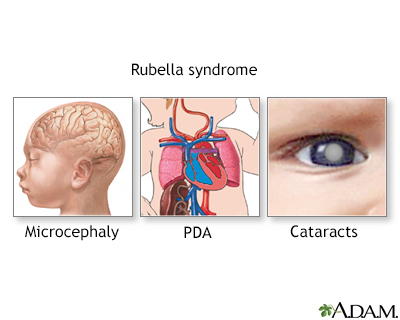Congenital rubella
Congenital rubella is a condition that occurs in an infant whose mother is infected with the virus that causes German measles. Congenital means the condition is present at birth.
Causes
Congenital rubella occurs when the rubella virus in the mother affects the developing baby in the first 3 months of pregnancy. After the fourth month, if the mother has a rubella infection, it is less likely to harm the developing baby.
The number of babies born with this condition is much smaller since the rubella vaccine was developed.
Pregnant women and their unborn babies are at risk if:
- They are not vaccinated for rubella
- They have not had the disease in the past
Symptoms
Symptoms in the infant may include:
- Cloudy corneas or white appearance of pupil
- Deafness
- Developmental delay
- Excessive sleepiness
- Irritability
- Low birth weight
- Below average mental functioning (intellectual disability)
- Seizures
Seizures
A seizure is the physical changes in behavior that occurs during an episode of specific types of abnormal electrical activity in the brain. The term ...
 ImageRead Article Now Book Mark Article
ImageRead Article Now Book Mark Article - Small head size
- Skin rash at birth
Exams and Tests
The baby's health care provider will order blood and urine tests to check for the virus.
Treatment
There is no specific treatment for congenital rubella. The treatment is symptom-based.
Outlook (Prognosis)
The outcome for a child with congenital rubella depends on how severe the problems are. Heart defects can often be corrected. Damage to the nervous system is permanent.
Possible Complications
Complications may involve many parts of the body.
EYES:
- Clouding of the lens of the eye (cataracts)
- Damage to the optic nerve (glaucoma)
Damage to the optic nerve
Glaucoma is a group of eye conditions that can damage the optic nerve. This nerve sends the images you see to your brain. Most often, optic nerve da...
 ImageRead Article Now Book Mark Article
ImageRead Article Now Book Mark Article - Damage to the retina (retinopathy)
Damage to the retina
Retinopathy of prematurity (ROP) is abnormal blood vessel development in the retina of the eye in infants that are born too early (premature)....
Read Article Now Book Mark Article
HEART:
- A blood vessel that usually closes shortly after birth remains open (patent ductus arteriosus)
Patent ductus arteriosus
Patent ductus arteriosus (PDA) is a condition in which the ductus arteriosus does not close. The word "patent" means open. The ductus arteriosus is ...
 ImageRead Article Now Book Mark Article
ImageRead Article Now Book Mark Article - Narrowing of the large artery that delivers oxygen-rich blood to the heart (pulmonary artery stenosis)
- Other heart defects
CENTRAL NERVOUS SYSTEM:
- Intellectual disability
- Difficulty with physical movement (motor disability)
- Small head from poor brain development
- Brain infection (encephalitis)
Brain infection
Encephalitis is irritation and swelling (inflammation) of the brain, most often due to infections.
 ImageRead Article Now Book Mark Article
ImageRead Article Now Book Mark Article - Infection of the spinal column and tissue around the brain (meningitis)
Infection of the spinal column and tiss...
Meningitis is an infection of the membranes covering the brain and spinal cord. This covering is called the meninges.
 ImageRead Article Now Book Mark Article
ImageRead Article Now Book Mark Article
OTHER:
- Deafness
- Low blood platelet count
- Enlarged liver and spleen
- Abnormal muscle tone
- Bone disease
When to Contact a Medical Professional
Contact your provider if:
- You have concerns about congenital rubella.
- You are unsure if you have had the rubella vaccine.
- You or your children need a rubella vaccine.
Prevention
Vaccination prior to pregnancy can prevent this condition. Pregnant women who have not had the vaccine should avoid contact with people who have the rubella virus.
Reviewed By
Neil K. Kaneshiro, MD, MHA, Clinical Professor of Pediatrics, University of Washington School of Medicine, Seattle, WA. Also reviewed by David C. Dugdale, MD, Medical Director, Brenda Conaway, Editorial Director, and the A.D.A.M. Editorial team.
Gans HA. Rubella. In: Kliegman RM, St. Geme JW, Blum NJ, et al, eds. Nelson Textbook of Pediatrics. 22nd ed. Philadelphia, PA: Elsevier; 2025:chap 294.
Gershon AA. Rubella virus (German measles). In: Bennett JE, Dolin R, Blaser MJ, eds. Mandell, Douglas, and Bennett's Principles and Practice of Infectious Diseases. 9th ed. Philadelphia, PA: Elsevier; 2020:chap 152.
Poland GA, Ovsyannikova IG, Kennedy RB. Rubella (German measles). In Goldman L, Cooney KA, eds. Goldman-Cecil Medicine. 27th ed. Philadelphia, PA: Elsevier; 2024:chap 339.
Disclaimer
© 1997- A.D.A.M., a business unit of Ebix, Inc. Any duplication or distribution of the information contained herein is strictly prohibited.





